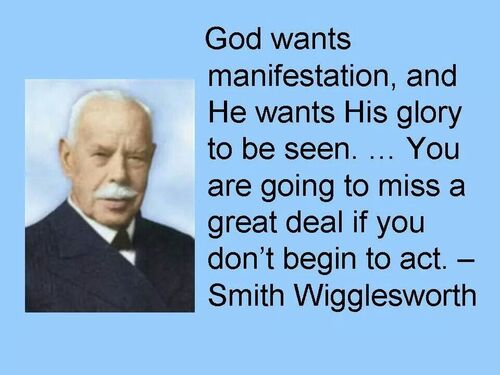If you seek nothing but the will of God, He will always put you in the right place at the right time.
Known as the "apostle of faith", he was described at the time as a man "filled with the Holy Spirit." He lived and walked continually in the presence of the Lord. And the miracles that accompanied his ministry were of a kind never seen since the days of the apostles. Blind, deaf, maimed, deformed by disease, hopeless on the threshold of death, with cancer or another disease, all were healed by the Power of the Creator. Even the dead were resurrected.
Smith was born on June 8, 1859, in the small and peaceful town of Menston, in the county of Yorkshire, England. His first years of life, which were mired between poverty and illiteracy, were marked by a hunger for God, despite the fact that his parents were estranged from Christ. And it is that his grandmother, a faithful follower of the Lord Jesus Christ, always made sure that Smith attended Christian meetings. Thus, when he was eight years old, he joined the Methodist Church and had a clear knowledge of the new birth in God. Then, he realized what the death and resurrection of Jesus meant to him and he embraced Christianity with all his heart.
CALL EARLY
Soon he began to operate as the preacher he would later be. His first convert was his own mother Martha. Then, when he was thirteen years old, he and his family moved to the city of Bradford, where he joined the Methodist Church. Although he could not read, it was at this time that Smith began to get in the habit of always carrying a copy of the New Testament. Then in 1875, when he was about sixteen years old, the Salvation Army opened a mission in Bradford, and Smith found there a powerful ally in his aspiration for people to know the Savior. In the meetings, he realized that there was great power behind prayer and fasting.
At seventeen, Wigglesworth met a man of God in a factory who took him in as an apprentice and taught him the trade of a plumber. He also talked about what the Bible teaches about water baptism, and soon after, Smith gladly obeyed and was baptized. During this time, he also learned more about the second coming of Christ. Eventually, in 1877, at the age of eighteen, he decided it was time to set out on his own. So, he went to a plumber's house and asked for a job. Although in the first instance he was not hired, he was welcomed by the man because he observed “something different” in him.
Two years later, Smith moved to the city of Liverpool to give his life a new lease of life. It was in this famous English port that he began ministering to the children of the city. Ragged and hungry infants came to him to hear the Gospel. Wigglesworth did his best to feed and clothe them with the earnings from his job as a plumber. He also visited hospitals and ships. He also prayed and fasted every Sunday, and asked God for the unsaved. Similarly, he was frequently invited by the Salvation Army to speak at their meetings, and he often broke down and wept in front of the people out of concern for the salvation of souls.
APOSTLE OF THE TWENTIETH CENTURY
It was also around this time that Smith Wigglesworth watched with great interest as a young, socially affluent woman showed up at one of the Salvation Army meetings and fell to her knees and surrendered to God. Her name was Mary Jane Featherstone, but everyone called her "Polly." Between them, over the years, a romance blossomed that ended in a happy consummated marriage on May 2, 1882. She was twenty-two and he was twenty-three. Smith learned to read after marrying Polly. In their thirty years of marriage, they had five children: Alicia, Seth, Harold, Ernest, and George.
In 1907, at the age of 48, he received the baptism of the Holy Spirit, and he became a unique Christian, his temperament and his way of life changed radically. Smith Wigglesworth was called by God to the evangelistic ministry to go to the nations of the earth, and from then on he always worked with total independence from the denominations, but with great closeness and love with the pastors and churches that opened their doors for him. The Lord led him to minister in great healing and miracle meetings, imparting faith to crowds, preaching the message of salvation, praying for the sick, and challenging believers to pass through the baptismal waters.
Wigglesworth had a commanding presence that radiated authority. He was courteous and kind, but austere. He was filled with God's compassion, love, and faith and challenged his listeners to hunger and thirst for the presence of the Almighty. He said that: "nothing in the world can fascinate us as much as being close to Jesus Christ." He was particularly generous: with the brothers, with the churches, and especially with the poor. It offered some private dinners for very poor people based on the words of Jesus, in Luke 14: 13-14: “But when you make a feast, call the poor, the maimed, the lame and the blind; and you will be blessed ”. At these dinners, many people were converted.
His wife Polly passed away in 1913, but first, she had to convince him that the Lord was calling her because he did not stop praying that she would not die. Only until the Most High spoke to her did Wigglesworth let her go, but he missed her forever. He then traveled extensively preaching the Word of Christ until shortly before his death.
As a tireless traveler, Smith brought the Word of the Lord to Sweden, the United States, Australia, New Zealand, South Africa, India, Ceylon, and various countries in Europe and various islands in the Pacific Ocean. Some of his sermons were transcribed for Pentecostal magazines and were also collected in two books: "Ever Increasing Faith" and "Faith that Prevails." A man of doctrine as iron as metal, he testified that God had healed him of appendicitis and much of his missionary work focused on healing by faith that aroused the interest of the international press. In his various biographies it is detailed that he returned several people from the dead, including his own wife Polly.
Smith Wigglesworth died on March 12, 1947, at the age of 87. His greatest legacy was the example of his faith in the Lord Jesus Christ, his love for souls, and his insatiable search for the spread of the Gospel and his communion with the Holy Spirit. And although he never formed his own denomination or wrote a book, much less a systematic set of doctrines and theology, his simple conviction in God still inspires every believer in the world today.














